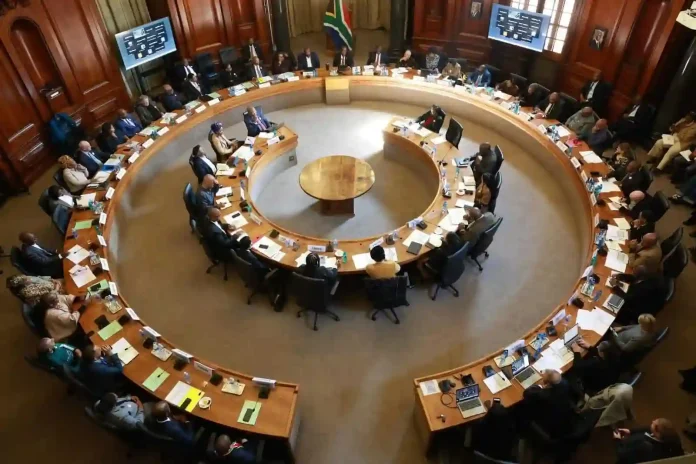
As published by Ntombi Nkosi in the African Times
Just days before South Africa’s first National Convention of the National Dialogue, the process is pressing ahead under intense political pressure, despite the withdrawal of several prominent foundations who warn the citizen-led project risks being compromised.
Become an insider. Subscribe to our newsletter for more top trending stories like this!
The high-profile resignations – by the Thabo Mbeki Foundation, FW de Klerk Foundation, and Desmond & Leah Tutu Legacy Foundation – have left organisers scrambling to reassure the public that the Dialogue remains inclusive and independent.
At the heart of the dispute is money – a reported R700 million budget – and fears that the process could be captured by political interests rather than genuinely empowering citizens.
The Convention, scheduled for 15–16 August at UNISA, will bring together 1,000 delegates from government, political parties, civil society, business, labour, traditional and religious leaders, cultural workers, sports bodies, women’s groups, youth movements and community structures. Organisers say the aim is to agree on the themes, structure and approach for nationwide public dialogues over the coming months, culminating in a second National Convention in 2026.
But controversy over the R700 million budget has threatened to overshadow preparations. Critics argue the money could be better spent on job creation and service delivery, while supporters maintain that investing in a national consensus process is crucial for South Africa’s future.
On Sunday, the Presidency dismissed claims of reckless spending. Spokesperson Vincent Magwenya said the process complies with the Public Finance Management Act (PFMA) and that organisers had cut costs by securing free venues, services, and donations.
“In response to the call for collaboration to reduce costs, UNISA has offered to host the first National Convention free of charge, providing venues, an operations centre, catering, ushers, AV services, printing, signage, conference materials, and WiFi,” Magwenya said.
Some services – including public viewing screens, rail and road transport – are also being provided at no cost. The first Convention is being funded from existing NEDLAC and Presidency budgets, with reimbursements planned later this year.
Magwenya stressed the Dialogue’s purpose: “The Presidency is committed to supporting a citizen-led and inclusive National Dialogue.”
The withdrawal of the three major legacy foundations – all linked to former presidents – has rocked preparations. Sources close to the organisations told African Times they feared the Dialogue was “drifting away from its original spirit” and that control was shifting towards government.
Their exit prompted the formation of a new Convention Organising Committee, made up of civil society organisations, NEDLAC, UNISA and the Presidency, to complete final preparations.
“We must not allow any grouping to control a process that should truly belong to citizens and society in general,” the new committee declared on Monday.
The ANC has backed the Dialogue wholeheartedly. “This is not a luxury – it is an urgent necessity,” said spokesperson Mahlengi Bhengu-Motsiri. “We have deep divisions in our country. We must sit together, agree on a way forward and commit to real change.”
The DA accused the government of wasting scarce resources. “We’ve had dialogues and summits before, often at great cost, with little to show,” said chief whip Siviwe Gwarube. “R700 million could build schools and clinics instead of funding another elite gathering.”
Become an insider. Subscribe to our newsletter for more top trending stories like this!
The EFF said it would attend but labelled the event “a staged PR stunt.” “The people need jobs and services, not another talkshop,” said EFF spokesperson Leigh-Ann Mathys.
The IFP urged transparency and rural inclusion. “If done properly, this could be meaningful,” said MP Narend Singh. “But the process must be transparent, fair and reach the most marginalised.”
GOOD party leader Patricia de Lille warned that “broad declarations without implementation will only deepen cynicism.”
Organisers say each of South Africa’s 4,300 wards will host at least three dialogues in venues ranging from community halls to open spaces, with millions engaged through media and social platforms. The process will culminate in a second National Convention in 2026 to finalise a “National Compact” for transformation.
On the streets, ordinary South Africans are split.
“It’s a lot of money, but if it brings real change, then maybe it’s worth it,” said Pretoria taxi driver Thabo Molefe.
Student Ayanda Nkosi dismissed it outright: “We’ve seen this movie before – people talk, government nods, and nothing changes.”
Pensioner Maria Mothupi said she would join her local dialogue “if they let us speak freely and if they actually listen.”
With four days to go, the National Dialogue faces its first major credibility test: proving it can be both independent and impactful. The foundations’ withdrawal has already dented perceptions, while the R700 million price tag is fuelling public mistrust.
Political analyst Prof. Tinyiko Maluleke offered a stark warning: “If this Dialogue becomes just another talkshop, it will not only waste money – it will damage the very idea of citizen participation.”
This article has been published in partnership with the African Times.
Become an insider. Subscribe to our newsletter for more top trending stories like this!




